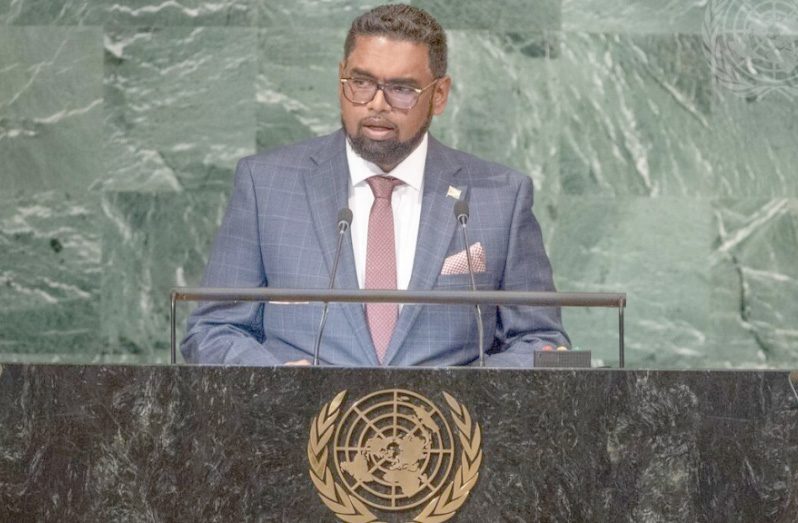–to lobby for this to be a key component in the discussions at COP, President Ali says
AS the climate crisis accelerates, Guyana is stepping decisively onto the international stage with a bold ambition to develop global policies and a market that places biodiversity at the forefront of the global environmental agenda.
During his remarks on this week’s episode of United for Biodiversity: The Alliance Podcast, President, Dr. Irfaan Ali outlined how Guyana’s environmental stewardship is built on action not promise.
“Guyana, as we’re all aware, is now a leader on the issue of climate and environment. Of course, we are leading most of the Global Forum on forest, tropical forest, and the most natural offshoot of that is to expand our leadership, to complement the entire ecosystem around our forest, and that is biodiversity,” he said.
With the world grappling with the effects of climate change and biodiversity being severely damaged, over the past few decades, the President said that he believes this grave issue is not being given enough global attention.
President Ali went on to emphasise the importance of preserving our planet while pointing out that within the last 50 years, it is estimated that the world has lost more than 50 per cent of its global biodiversity.
Guyana’s approach to countering and mitigating the devastating effects of climate change, however, is commendable.
The nation’s approach has been lauded globally as the country that boasts a forest cover of over 85 per cent, and has been stern about protecting its biodiversity.
He said: “Here in Guyana, we’ve managed to keep our biodiversity intact. We have managed to keep the richness of our biodiversity intact, and we are of the view that the world must now pay attention to the issues surrounding biodiversity.
“And in paying attention to the issues surrounding biodiversity, there must be a system that recognises biodiversity as an important element in the climate equation, and in so doing, we must find policy mechanism; we must find market mechanisms to support and safeguard our biodiversity here in Guyana and around the world.”
The President also pointed to the country’s Low Carbon Development Strategy (LCDS) which has shown the world how Guyana can balance and protect its biodiversity amidst economic growth.
He said: “So our LCDs is not an environmental strategy or a climate strategy, it is a national development strategy, and that is why in the LCDS 2030, it speaks about biodiversity. It speaks about the marine economy. It speaks about, of course, the forest. It speaks about climate resilience. It speaks about financing, adaptation, mitigation.
“It was a very comprehensive strategy that speak to countries, aspirations, countries’ development trajectory, and link that to environmental sustainability and policy sustainability, because it is important that we create policies that enables the sustainability of our system, policies that can create wealth because the population requires economic wealth, policies that can enhance our infrastructure, policies that can expand our outlook, create new opportunities, jobs, whilst at the same time being sustainable and resilient in nature.”
Guyana’s approach has been hailed as a model for the world, especially in its direct financial support to indigenous communities with funds earned from the sale of carbon credits.
Although there has been much discussion surrounding the environmental state of the world, the President cited lack of action.
“…We had all of these pledges at various COP and we saw nothing coming out of the pledges. So, I’m just weary and tired of the pledges. But here is where Guyana has shown that we go beyond pledges. We create a product. We create a mechanism. We create a formula and through the LCDs, the carbon credits, we have demonstrated how we can make this work,” he said.
Guyana, which previously led the fight to put tropical forests on the COP agenda, is now taking the same ambitious approach with biodiversity.
THE GOAL?
According to the President, the aim is to have biodiversity formally integrated into climate negotiations and financing at the upcoming COP in Brazil, and ultimately, to establish it as a high priority on the international stage at the United Nations (UN).
The Head of State said: “We led the fight to have tropical forest on the agenda. Tropical forest was never on the agenda. It is Guyana that led that fight to have tropical forest on the COP agenda, on international agenda.
“So today, we are taking on this global, this international struggle. We’re taking on this international responsibility, I would say, of ensuring that we work with like-minded allies on this, to have biodiversity as a key component in the discussions at COP, and also to have it now on the global attention at the United Nations.”
The upcoming Global Biodiversity Alliance Summit, that will be held this month, is a strategic two-day event which will be led by President Ali.
Its aim is to strengthen international commitment to biodiversity conservation.
The summit will bring together world leaders, biodiversity experts, key stakeholders from various sectors, and local community representatives to align efforts, define joint goals, and establish a global coalition for biodiversity conservation and restoration.
One of the key pillars of this initiative is the introduction of the Global Biodiversity Product and a comprehensive biodiversity index, which will provide measurable indicators to track progress and ensure accountability.
The event will serve as a call to action, fostering global collaboration and providing a platform for countries to demonstrate their dedication to protecting ecosystems that sustain life on Earth.
Guyana leads call for integration of biodiversity into climate negotiations, financing
SHARE THIS ARTICLE :
Facebook
Twitter
WhatsApp



.jpg)








